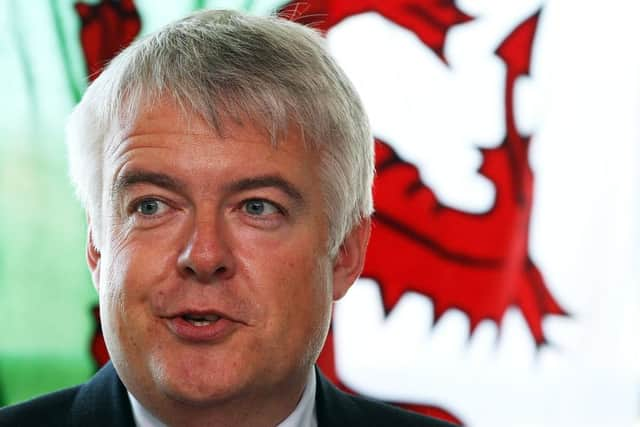Paris Gourtsoyannis: May must consider devolution dividend


Just how much has Brexit stretched and strained the bonds of the Union? Consider the following comments from the First Minister, just as Theresa May begins her four-nation goodwill tour to build support across the UK ahead of Brexit talks with the EU.
“We are going to end up in the courts unless we can sort this out,” a newspaper was told, having asked about the status of powers returning from Brussels after Brexit.
Advertisement
Hide AdAdvertisement
Hide Ad“Our devolution settlement says agriculture is devolved, full stop. We are never going to accept Brussels is replaced by London. Their heads are not around this yet.
“There was as much frustration on the doorstep about the UK government as about the EU [during the referendum]. At the end of the day, it’s not as if Westminster is and Whitehall were fantastically popular.”
Typical Nationalist grievance, you may well say. Except the First Minister in question isn’t Nicola Sturgeon, but Welsh Labour leader Carwyn Jones.
Despite the principality’s vote for Brexit, the Welsh First Minister has taken almost as hard a line as the SNP in condemning the UK’s government’s approached to the devolved nations.
With the Prime Minister in Swansea yesterday, Jones warned the UK government that it risks stoking up the same antipathy towards Westminster that inspired the Brexit vote.
It is an intervention that should deeply concern the UK government and Unionists everywhere. Without using the R-word, one of Labour’s most senior figures has questioned whether the UK has a future.
“If they are not careful, people’s sense of disengagement with Brussels will simply attach itself to London,” he said. “They are giving the impression sometimes that they do not listen.
“We need to see there is a dividend in being a devolutionist government that supports the Union, and we don’t see that dividend.
Advertisement
Hide AdAdvertisement
Hide Ad“Otherwise people in Wales are going to start saying, ‘Well, the government is listening to the Scots – we need to be like them.’ And that’s a dangerous path for the UK.”
With the date for triggering Article 50 finally fixed and the UK about to take its first real steps toward the door of the EU, Jones’ comments show just how much is at stake over the next two years. Relations between the UK government and devolved administrations have taken a battering and are in urgent need of resuscitation. Last week’s tit-for-tat TV pronouncements by Sturgeon and May poisoned the respect agenda between London and Edinburgh.
It falls to the Prime Minister to deliver the kiss of life. The tone, both of the message she carries north of the Border and the response she gets, will be closely watched in the wake of last week’s public breakdown in communication. So far, May has been better at delivering the tough love. David Cameron, admittedly with the luxury of not having to negotiate the UK’s exit from the EU, got away with handling Scotland with kid gloves.
The Prime Minister’s style is instead to go in swinging. Even her early moves, travelling up to Edinburgh to tell the First Minister she would listen, had something of the law of the jungle about them, getting on to her opponent’s territory and asserting her authority.
It should not be surprising to see that morph into the current approach of telling Sturgeon to stop her constitution-bothering until she puts her government in order.
May will use her Article 50 tour date in Scotland to show she is listening to the half of Scotland that dreads a second independence referendum and doesn’t want to lose the Union.
But in the long run, the Prime Minister may have to listen to the likes of the Labour leader in Wales and Gordon Brown, and offer more than just sound bites if she wants to safeguard the future of the UK through the Brexit process.
Labour’s top personalities will meet in Cardiff to develop the cause championed by Kezia Dugdale and supported by Jeremy Corbyn – a new federal settlement for the UK. With the party in disarray at Westminster and languishing at Holyrood, the political establishment would be forgiven for ignoring the gathering.
Advertisement
Hide AdAdvertisement
Hide AdThe party will also have to resolve its position on how resources will be shared across the UK if its federal dream is ever to become a reality. Also present at the gathering will be “metro-mayor” candidates including Sion Simon, who has based his campaign to lead the West Midlands around a slogan of “take back control” and a policy of abolishing the Barnett Formula.
That Labour has to rely on such naked economic nationalism to fight what amounts to a local election shows how hollowed out the party is, and Dugdale should use the occasion to have a word in Simon’s ear.
Federalism needs to be promoted with an English voice to have any hope of success, and voters in England who see devolution as nothing more than a vehicle for handing more money and power to other parts of the UK at their expense have to be brought onside. But if the message from Labour on doorsteps in suburban England is one of beggar-thy-neighbour, then the fight to save the Union will be hobbled from the start.
That said, discussions in Cardiff can form the blueprint of an offer to Scotland, Wales, Northern Ireland and the forgotten parts of England – something that can provide the “devolution dividend” that Jones is talking about.
It would require the UK government not only to be clear about the contested powers that are returning from Brussels, but also to be open to a wider discussion about the constitution that could include further devolution.
That isn’t likely while Westminster ministers are locked in difficult talks with Brussels.
But eventually, the Prime Minister will need to consider what she can offer when she makes subsequent trips to the four corners of the UK.